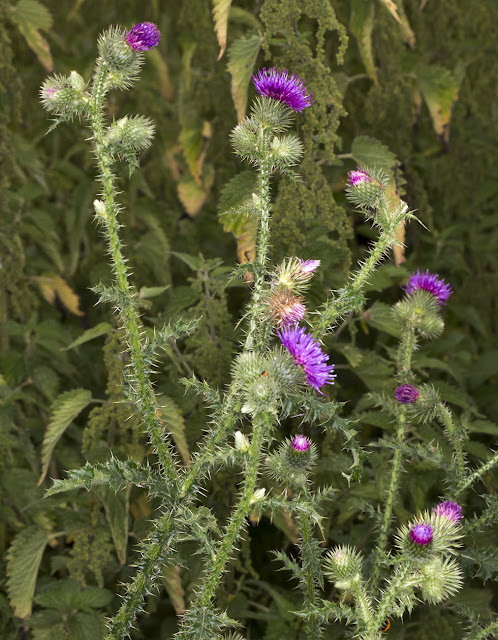 |
| Bristly Oxtongue, Helminthotheca echioides. Leybourne Lakes, 12 July 2015 |
There were some lovely specimens around the lakes which were not particularly water-loving, but which were growing big and lush in this friendly enviromnent. Some were so large that I could not take a representative photo which still allowed you to see any details; that's why there is no Teasel in this post.
This Bristly Oxtongue was as tall as I am, and I usually see it two or three feet high. It's easy to recognise in leaf because they are covered with those little blisters, each with a prickle in the centre. The flowers are cupped by very distinctive bracts.
 |
| Prickly Lettuce, Lactuca serriola. Leybourne Lakes, 12 July 2015 |
A tall Prickly Lettuce. Another prickly plant. The prickles on this one run along the centre of the underside, of the leaves, and are larger than you might expect.
 |
| Weld, Reseda luteola. Leybourne Lakes, 12 July 2015 |
 |
| Weld, Reseda luteola. Leybourne Lakes, 12 July 2015 |
This is Weld, a plant that used to yield a yellow dye. I expect it still does if you know how to extract it. Apparently, lush green specimens like this were not favoured by the dyers, who wanted yellower plants grown in less forgiving environments. In the closeup you can see the clusters of stamens, not yet open, surrounding the stigmas.
 |
| Welted Thistle, Carduus crispus. Leybourne Lakes, 12 July 2015 |
 |
| Welted Thistle, Carduus crispus. Leybourne Lakes, 12 July 2015 |
And finally, there were several lovely specimens of this pretty Welted Thistle. Creeping Thistle and Spear Thistle are very common, Marsh Thistle and Welted Thistle less so, and this is much prettier than the Marsh Thistle.






No comments:
Post a Comment